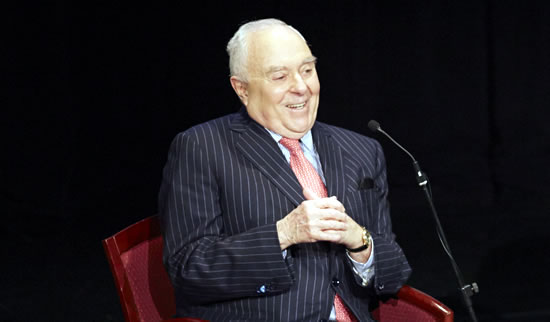Joseph A. Califano, Jr. Sheds New Light on Lyndon B. Johnson
at Hunter College
By Lydia Liebman

Recently, The Roosevelt House Public Policy Institute at Hunter College presented a riveting book discussion with Jonathan F. Fanton, President of the American Academy of Arts and Sciences, and Joseph A. Califano, Jr., Founder and Chair Emeritus of the National Center on Addiction and Substance Abuse at Columbia University and author of The Triumph & Tragedy of Lyndon Johnson: The White House Years.
Califano served as President Lyndon B. Johnson’s chief aide for domestic affairs from 1965 to 1969 and Secretary of Health Education and Welfare in the Carter administration from 1977 through 1979. “The Triumph & Tragedy of Lyndon Johnson: The White House Years” was originally published in 1991 and hailed as “a joy to read” by The Washington Post and “readable, forthcoming and shrewd” by the New York Review of Books. Recently republished with a new 7500-word introduction by Califano, the book is a compelling addition to the biography genre.
Led by Jonathan F. Fanton, the book discussion touched upon a myriad of topics relating to the LBJ administration. Califano made it clear that “poverty and civil rights were the overwhelming objectives of the administration.” He also noted that LBJ “desperately wanted the war to end in Vietnam” and entered every discussion with the mindset of “making a bipartisan deal.”
The recently released historical film “Selma” proved to be a popular topic at the discussion as Califano fielded related questions from both Fanton and the audience. “In the movie, LBJ is portrayed as quite condescending when in fact Martin Luther King Jr. and Johnson had a true partnership,” said Califano, when asked to react to the portrayal of Johnson in the film. “We tend to look at Martin Luther King as a purely religious man but he was a shrewd politician,” said Califano, “He was not a naïve preacher. I think that’s why Johnson and King got along.” He added that he thinks if King had been given the opportunity, he would have been “a damn good president!”
The audience at Hunter College also learned that there were many programs and proposals that did not come to fruition due to the war. One of those was the Model Cities Program, which intended to rebuild every ghetto in the United States including schools, homes and health systems. “We needed a lot of money to do that,” said Califano; “there just wasn’t enough money to truly implement that program and it fizzled under Nixon.” Califano also described a “massive jobs program” they had hoped to enact, which would have created 2.5 billion jobs. Of the programs that were realized, Califano cited the arts programs and Medicare as being some of the most successful and the higher education programs being the least. “There were no provisions to encourage universities to become more efficient,” said Califano.
The evening ended on a positive note with Califano expressing his optimism for the future. “We have a tremendous resilience in this country,” he said, adding that it is “incredibly important that people vote.” He noted that future generations of voters would no longer learn history through books but instead through new technologies, including eBooks and the iPhone. #
